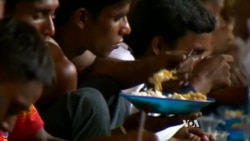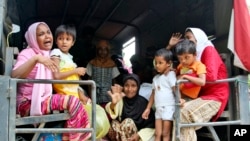International agencies are calling on navies in Southeast Asia to rescue as many as 10,000 migrants from Myanmar and Bangladesh who may be stranded at sea and facing an uncertain fate.
In recent days, around 2,000 boat people from the two countries have been rescued or swam ashore in Malaysia and Indonesia.
But some smugglers and crews reportedly abandoned ship after Thai authorities cracked down on their safe havens, mostly located on rubber plantations in the country’s south. Now observers say some crews are unwilling or unable to get their passengers to Malaysia and Indonesia, putting them at peril.
“People have to get off these boats. Every day we know there will be more people who are more vulnerable and that people will die,” Jeffrey Labovitz, the International Organization for Migration's mission chief in Thailand, told VOA.
The IOM and others want Southeast Asian governments to find and rescue those stranded on the high seas.
"If there is not an immediate and concerted search-and-rescue effort due to regional political concerns that these migrants and individuals being trafficked may then wish to seek refugee status and associated protections, we will undoubtedly have mass casualties on our hands," said David Hammon, founder of the non-government group Human Rights at Sea.
In Thailand, authorities announced holding a regional meeting later this month with officials from 15 neighboring countries to discuss a coordinated response to the “unprecedented” irregular migration across the Bay of Bengal.
Earlier Tuesday, the Indonesian Navy said it had refueled and sent one vessel on its way, declaring the 500 migrants on board alive, in good shape and supposedly unwilling to set foot in Indonesia.
“That kind of approach holds the seeds of disaster in response for this Rohingya flotilla that now needs to be found and assisted,” said Phil Robertson, Asia deputy director of Human Rights Watch.
Rohingya fleeing persecution in Myanmar
It is estimated that about half of those stranded at sea right now are Muslim Rohingya — victims of sectarian violence and discrimination in Myanmar and deemed illegal migrants most elsewhere if they are fortunate enough to survive their perilous journeys.
"Feces gets in their water. They don't have bathroom breaks," explained IOM's Labovitz. "They're stuffed underneath ships, often. If anyone acts up they can be thrown overboard at any time and certainly will be beaten."
One migrant from Myanmar, Muhammad Husin, who came ashore this week in Aceh, Indonesia told reporters his group on a small boat reached Thai waters after two months.
"We were captured and held on our boat for 20 days by what I believe is Thailand's navy," recalled Husin. "Although we requested food and water, they gave us only very little. If we asked for more, they beat us. We requested to go to Malaysia, but they refused."
HRW's Robertson says the Rohingya "have very few friends except those who are willing to exploit them and extort them. And, unfortunately, more and more stories come out about the collusion of officials with the traffickers who have been abusing these people."
Robertson said this "raises some fundamental questions about the larger commitment of many of these governments to anti-trafficking."
Thailand pledges crackdown on smugglers
After the discovery this month of mass graves in so-called "slave camps" in the jungles of southern Thailand, the military junta in Bangkok has vowed to quickly eradicate the smuggling network in the kingdom. So far about 50 arrests have been made in Thailand.
The junta boss, former army chief Prayuth Chan-ocha, blames "international crime" for the smuggling that has Thailand in between the origination points (Myanmar and Bangladesh) and the desired destination (Malaysia).
"We need international organizations to help solve the problem," Prayuth told a news conference Tuesday, where he acknowledged Thai authorities have not been effective in handling the issue.
The Rohingya pay smugglers to take them to Malaysia, which has generally tolerated the clandestine immigration, but many of the migrants are asked to pay additional money while being held in Thailand.
"This is not something that has been going on in secret," asserted Robertson of Human Rights Watch. "This is a buffet that everybody has been eating from for the last several years. The problem is, of course, this kind of corruption is coming at the expense of the poorest, most desperate group in the Southeast Asia region."
Migrations sharply up in 2015
Including destitute economic migrants, a total of 25,000 people are believed to have taken boats from Bangladesh and Myanmar in the first three months of 2015, double the number in the same period last year.
The precise number of those still at sea is far from certain. Most U.N. agencies and non-government groups are relying on the information gathered by a single advocate for the Rohingya, Chris Lewa, who runs the shoestring non-profit organization The Arakan Project.
"I'm interested to see how many more should start landing, " she told VOA. "There should be at least 7,000."
Of those fortunate enough not to be perish at sea or in the jungle way-stations, a significant percentage arrive at their destination in extremely poor physical condition.
Forty percent are malnourished, about two to four percent of the survivors are deemed to be severely malnourished and 1.8 percent found to be inflicted with beriberi, a debilitating condition caused by a lack of vitamin B-1, according to IOM.
IOM's Labovitz says their condition reminds him of the haunting 1945 images of the emaciated survivors in the Auschwitz concentration camp run by the Nazis during World War II.







